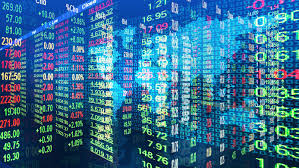Until now the rise of computers has democratised finance by cutting costs. A typical ETF charges 0.1% a year, compared with perhaps 1% for an active fund. You can buy ETFs on your phone. An ongoing price war means the cost of trading has collapsed, and markets are usually more liquid than ever before. Especially when the returns on most investments are as low as today’s, it all adds up. Yet the emerging era of machine-dominated finance raises worries, any of which could imperil these benefits.
到目前為止,計算機的興起通過降低成本使金融民主化。典型的ETF每年收取0.1%的費用,相比之下,主動型基金可能收取1%的費用。你可以在手機上購買ETF。一場持續的價格戰意味著交易成本大幅下降,市場的流動性通常比以往任何時候都更強。特別是當大多數投資的回報和今天一樣低的時候,這一切都是有意義的。然而,機器主導金融的新時代引發了這些好處可能被危及的擔憂。

One is financial stability. Seasoned investors complain that computers can distort asset prices, as lots of algorithms chase securities with a given characteristic and then suddenly ditch them. Regulators worry that liquidity evaporates as markets fall. These claims can be overdone—humans are perfectly capable of causing carnage on their own, and computers can help manage risk. Nonetheless, a series of “flash-crashes” and spooky incidents have occurred, including a disruption in ETF prices in 2010, a crash in sterling in October 2016 and a slump in debt prices in December last year. These dislocations might become more severe and frequent as computers become more powerful.
一是金融穩定。經驗豐富的投資者抱怨說,電腦可以扭曲資產價格,因為許多算法追逐具有特定特征的證券,然后突然拋棄它們。監管機構擔心,隨著市場下跌,流動性會蒸發。這些說法可能有些過火——人類完全有能力自己制造屠殺,而計算機可以幫助管理風險。盡管如此,還是發生了一系列“閃崩”和令人毛骨悚然的事件,包括2010年 ETF 價格的崩潰、2016年10月英鎊的暴跌和去年12月債務價格的暴跌。隨著計算機功能的增強,這種錯位可能會變得更加嚴重和頻繁。
Another worry is how computerised finance could concentrate wealth. Because performance rests more on processing power and data, those with clout could make a disproportionate amount of money. Quant investors argue that any edge they have is soon competed away. However, some funds are paying to secure exclusive rights to data. Imagine, for example, if Amazon (whose boss, Jeff Bezos, used to work for a quant fund) started trading using its proprietary information on ecommerce, or JPMorgan Chase used its internal data on credit-card flows to trade the Treasury bond market. These kinds of hypothetical conflicts could soon become real.
另一個擔憂是,電腦化的金融如何能夠集中財富。因為性能更多地依賴于處理能力和數據,那些有影響力的人可以賺到不成比例的錢。定量投資者辯稱,他們擁有的任何優勢很快就會被競爭殆盡。然而,一些基金正在為獲得數據的專有權而付費。想象一下,例如,如果亞馬遜(其老板杰夫•貝佐斯曾在一家定量基金工作)開始利用其在電子商務方面的專有信息進行交易,或者摩根大通利用其在信用卡流動方面的內部數據進行美國國債市場的交易。這種假想的沖突可能很快就會變成現實。
譯文由可可原創,僅供學習交流使用,未經許可請勿轉載。












